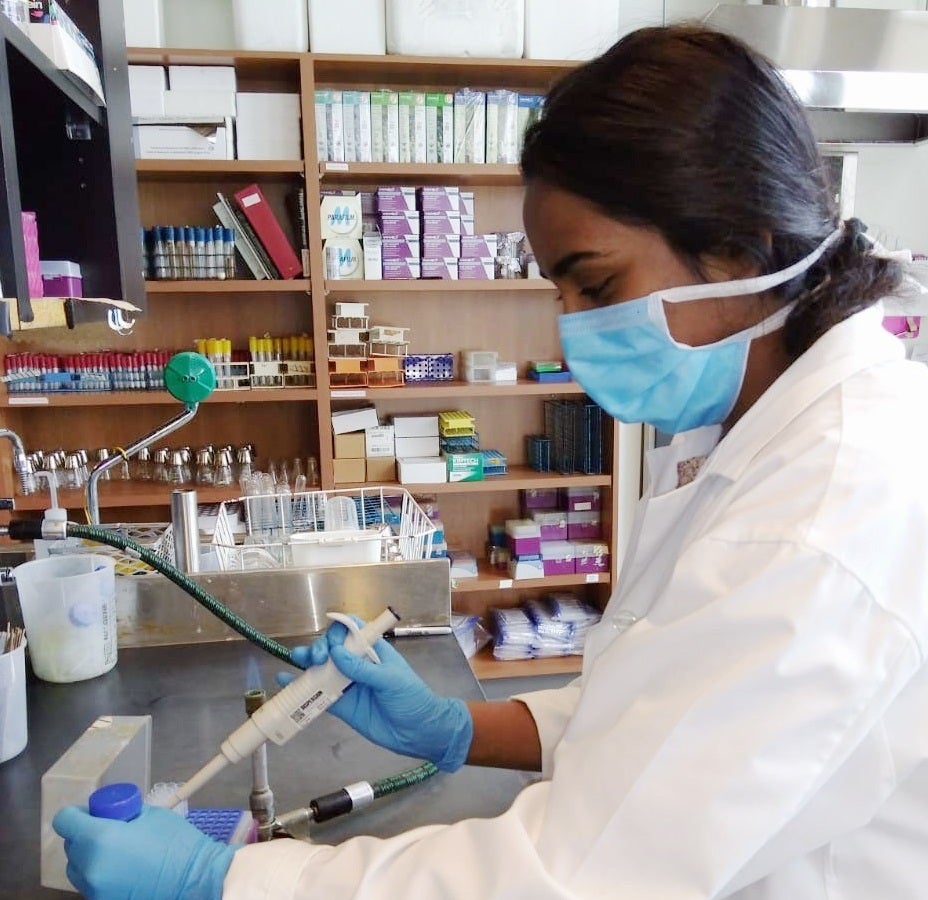Department of Chemical Engineering’s Professor Marc Aucoin and two colleagues from the University of Waterloo’s School of Pharmacy lean on years of collaboration across disciplines as they join the race to develop a vaccine for COVID-19.
Proof of concept
Efforts to design a SARS-CoV-2 vaccine is supported by the foundation of research professors Marc Aucoin and Roderick Slavcev embarked upon together a decade ago.
Their research evolved from a need to characterize levels of foreign proteins displayed on the surface of bacteriophage, a virus that infects bacteria. These viruses are nearly impossible to see, even with electron microscopes, and this makes it difficult to study their behaviour.
Collaborative research between the Aucoin and Slavcev labs showed that bacteriophage can be decorated with different amounts of fluorescent protein, which allows the nanoscopic virus to be ‘seen’ through a microscope. More importantly, it was also a proof of concept for decorating the bacteriophage with something more relevant, such as a piece of a pathogenic virus, like SARS-CoV-2, that can incite an immune response.
Virus-like particles
Since that early collaboration, the Slavcev lab focused on phage therapeutics, and the Aucoin lab continued to pursue complex biologics, including antibodies, viruses and virus-like particles. It has concentrated on the genetic control of protein expression to create virus-like particles (VLPs).
VLPs are made of virus proteins that, unlike viruses, contain none of the genetic material required for the particle to self-replicate. VLPs are a very important element of vaccines because their inability to self-replicate makes it impossible for a vaccine to become pathogenic.
A dual-modality phage-based vaccine
In the fight against COVID-19, Aucoin and Slavcev are now working with the School of Pharmacy’s Professor Emmanuel Ho, who specializes in drug delivery, HIV infections and animal models. They are developing a dual-modality phage-based SARS-CoV-2 vaccine that can be delivered through a nasal spray.
“To engineer the COVID-19 vaccine,” Professor Aucoin explains, “we are decorating phage with a major protein from the SARS-CoV-2 virus. This, in and of itself, could be used as a vaccine, but we are going one step further. We are engineering the phage to carry genetic information that will enable human cells to make SARS-CoV-2 virus-like particles. We anticipate that this strategy will provide a one-two punch: reduce the symptoms of in-progress infections and provoke an immune response when it is encountered for the first time."
This multi-disciplinary effort relies on collaborative input from researchers with unique expertise and perspectives. The faculty members and the graduate students working in their labs are bringing together the best practices of their disciplines as well as unique and complementary skillsets to find a solution to the urgent problem posed by the coronavirus outbreak.
For more information about the vaccine, read University of Waterloo developing DNA-based COVID-19 vaccine.

In 2018, the Aucoin lab was part of a team that received a $1.6 million NSERC CREATE grant to train students at the interface of engineering and pharmacy. Harika Nagireddy, pictured above, is one of two Chemical Engineering graduate students studying the production of decorated phage and virus-like particles under the co-supervision of professors Aucoin and Slavcev.